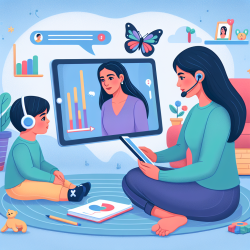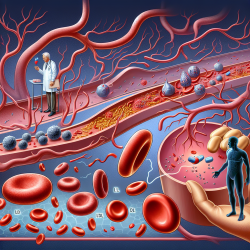Introduction
As practitioners in the field of speech-language pathology, it is imperative to base our interventions on evidence-based research to create optimal outcomes for children. The study titled "Life satisfaction mediates the association between childhood maltreatment and depressive symptoms: a study in a sample of Brazilian adolescents" provides valuable insights into the psychological dynamics affecting adolescents who have experienced childhood maltreatment. This blog aims to translate these findings into actionable strategies for practitioners.
Understanding the Research
The study conducted by de Vasconcelos et al. (2020) explores the relationships between childhood maltreatment, life satisfaction (LS), and depressive symptoms in Brazilian adolescents. The research highlights that life satisfaction can partially mediate the negative effects of childhood maltreatment on depressive symptoms. This means that higher life satisfaction can buffer the adverse effects of maltreatment, reducing the likelihood of developing depressive symptoms.
Key Findings
- Childhood maltreatment correlates negatively with life satisfaction.
- Life satisfaction correlates negatively with depressive symptoms.
- Childhood maltreatment correlates positively with depressive symptoms.
- Life satisfaction acts as a mediator, reducing the impact of maltreatment on depressive symptoms.
Implications for Practitioners
Practitioners can leverage these findings by focusing on enhancing life satisfaction in children who have experienced maltreatment. Here are some strategies:
- Promote Positive Family Dynamics: Encourage family therapy sessions to improve communication and relationships within the family, as family satisfaction has a strong correlation with life satisfaction.
- Boost Self-Esteem: Implement programs that focus on building self-esteem and self-worth in adolescents. Activities that promote self-discovery and self-acceptance can be beneficial.
- Foster Supportive School Environments: Work with schools to create a supportive and nurturing environment that can enhance students' satisfaction with their school life.
- Encourage Social Connections: Facilitate group activities that promote friendships and social skills, as satisfaction with friendships is a crucial component of life satisfaction.
Encouraging Further Research
While this study provides a foundational understanding, it also highlights the need for longitudinal studies to further elucidate these associations. Practitioners are encouraged to engage in or support research initiatives that explore the long-term effects of life satisfaction interventions on mental health outcomes in adolescents.
Conclusion
Incorporating the concept of life satisfaction into therapeutic practices offers a promising avenue for mitigating the negative impacts of childhood maltreatment. By focusing on enhancing life satisfaction, practitioners can play a pivotal role in improving mental health outcomes for adolescents.
To read the original research paper, please follow this link: Life satisfaction mediates the association between childhood maltreatment and depressive symptoms: a study in a sample of Brazilian adolescents.










